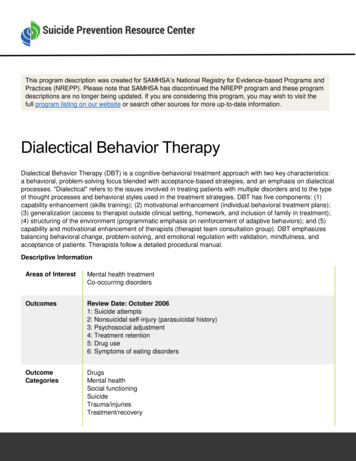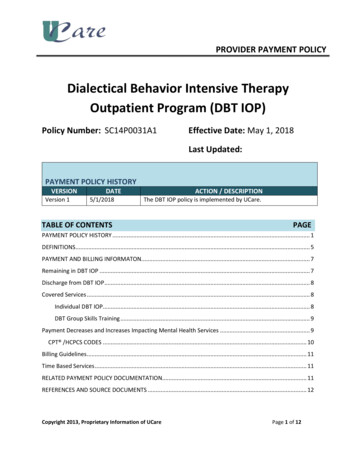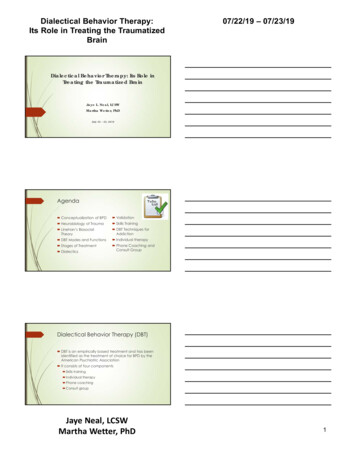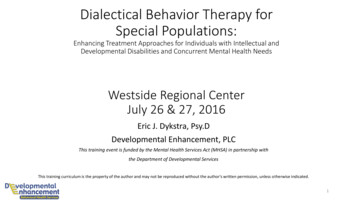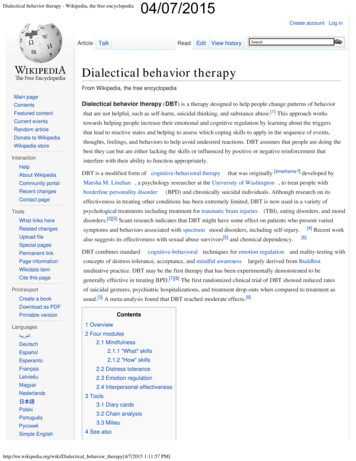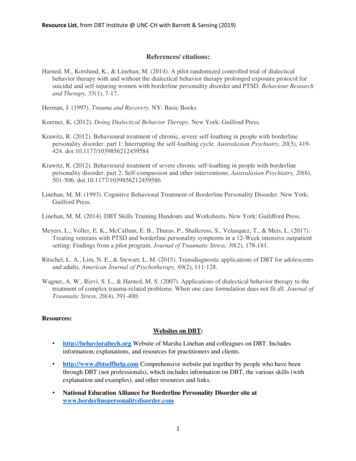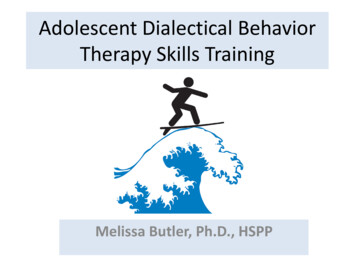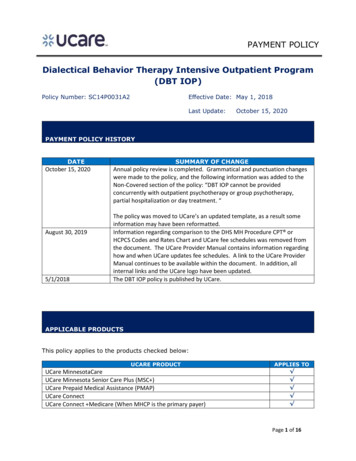
Transcription
PAYMENT POLICYDialectical Behavior Therapy Intensive Outpatient Program(DBT IOP)Policy Number: SC14P0031A2Effective Date: May 1, 2018Last Update:October 15, 2020PAYMENT POLICY HISTORYDATEOctober 15, 2020August 30, 20195/1/2018SUMMARY OF CHANGEAnnual policy review is completed. Grammatical and punctuation changeswere made to the policy, and the following information was added to theNon-Covered section of the policy: “DBT IOP cannot be providedconcurrently with outpatient psychotherapy or group psychotherapy,partial hospitalization or day treatment. “The policy was moved to UCare’s an updated template, as a result someinformation may have been reformatted.Information regarding comparison to the DHS MH Procedure CPT orHCPCS Codes and Rates Chart and UCare fee schedules was removed fromthe document. The UCare Provider Manual contains information regardinghow and when UCare updates fee schedules. A link to the UCare ProviderManual continues to be available within the document. In addition, allinternal links and the UCare logo have been updated.The DBT IOP policy is published by UCare.APPLICABLE PRODUCTSThis policy applies to the products checked below:UCARE PRODUCTUCare MinnesotaCareUCare Minnesota Senior Care Plus (MSC )UCare Prepaid Medical Assistance (PMAP)UCare ConnectUCare Connect Medicare (When MHCP is the primary payer)APPLIES TO Page 1 of 16
PAYMENT POLICYUCARE PRODUCTUCare Minnesota Senior Health Options (MSHO) (When MHCP is the primary payer)APPLIES TO TABLE OF CONTENTSTABLE OF CONTENTSPAGETable of ContentsPAYMENT POLICY HISTORY . 1APPLICABLE PRODUCTS . 1TABLE OF CONTENTS. 2PAYMENT POLICY OVERVIEW . 5POLICY DEFINITIONS . 5ENROLLEE ELIGIBILITY CRITERIA. 7Continued Participation Criteria . 8Discharge Criteria . 9ELIGIBLE PROVIDERS OR FACILITIES . 9Provider . 9Facility . 10Other and/or Additional Information . 10EXLUDED PROVIDER TYPES . 10MODIFIERS, CPT, HCPCS, AND REVENUE CODES . 11General Information . 11Modifiers . 11CPT and/or HCPCS Code(s). 11Revenue Codes. 12PAYMENT INFORMATION . 12Covered Services . 12Non-Covered Services . 13Page 2 of 16
PAYMENT POLICYPayment Increases and Reductions . 13Time Based Services . 14BILLING REQUIREMENTS AND DIRECTIONS . 15PRIOR AUTHORIZATI0N, NOTIFICATION AND THRESHOLD INFORMATION . 15Prior Authorization, Notification and Threshold Requirements . 15RELATED PAYMENT POLICY INFORMATION. 15SOURCE DOCUMENTS AND REGULATORY REFENCES. 15DISCLAIMER. 16Page 3 of 16
PAYMENT POLICYThis page was intentionally left blankPage 4 of 16
PAYMENT POLICYPAYMENT POLICY INSTRUCTIONSA payment policy assists in determining provider reimbursement for specific covered services. Toreceive payment, the provider must be in a contractual relationship with UCare and provide services to amember enrolled in one of UCare’s products. This payment policy is intended to provide a foundationfor system configuration, work instructions, call scripts, and provider communications. A paymentpolicy describes the rules for payment, which include applicable fee schedules, additional payment rulesby regulatory bodies, and contractual terms. This policy is a general guideline and may be supersededby specific provider contract language.PAYMENT POLICY OVERVIEWDBT IOP is a treatment program that uses a combination of individualized rehabilitative andpsychotherapeutic interventions. DBT IOP involves weekly individual therapy, weekly group skillstraining, weekly consultation team meetings, and telephone coaching, as needed.POLICY DEFINITIONSTERMClinical SupervisionDiagnostic AssessmentNARRATIVE DESCRIPTIONMeans the oversight responsibility for individual treatment plans andindividual mental health service delivery, including that provided by thecase manager. Clinical supervision must be accomplished by full or parttime employment of or contracts with mental health professionals.Clinical supervision must be documented by the mental healthprofessional cosigning individual treatment plans and by entries in theclient's record regarding supervisory activities.Means functional face-to-face evaluation resulting in a completewritten assessment that includes clinical considerations and severity ofthe client's general physical, developmental, family, social, psychiatric,and psychological history, and current condition. The DiagnosticAssessment will also note strengths, vulnerabilities, and needed mentalhealth services.Page 5 of 16
PAYMENT POLICYTERMNARRATIVE DESCRIPTIONDialectical BehaviorTherapy IntensiveOutpatient Program (DBTIOP)Mental Health ProfessionalMeans a treatment program that uses a combination of individualizedrehabilitative and psychotherapeutic interventions. A DBT IOP involvesweekly individual therapy, weekly group skills training, and telephonecoaching as needed and weekly consultation team meetings.Means one of the following: Clinical Nurse Specialist Licensed Independent Clinical Social Worker (LICSW) Licensed Marriage and Family Therapist (LMFT) Licensed Professional Clinical Counselor (LPCC) Licensed Psychologist (LP) Mental Health Rehabilitative Professional Psychiatric Nurse Practitioner (NP) Psychiatry or an Osteopathic physicianMeans a provider who are not eligible for enrollment, must be underclinical supervision of a mental health professional and must bequalified in at least one of the following five ways:1. Holds a bachelor’s degree in a behavioral science or a relatedfield, from an accredited college or university and meets eithera or b:a. Has at least 2,000 hours of supervised experience in thedelivery of mental health services to patients withmental illnessb. Is fluent in a non-English language of a cultural group towhich at least 50% of the practitioners patients belong,completes 40 hours of training in the delivery ofservices to patients with mental illness, and receivesclinical supervision from a mental health professional atleast once a week until the requirements of 2,000hours of supervised experience are met2. Has at least 6,000 hours of supervised experience in thedelivery of mental health services to patients with mentalillness. Hours worked as a mental health behavioral aide I or IIunder Children’s Therapeutic Services and Supports (CTSS) maybe included in the 6,000 hours of experience for child patients.3. Is a graduate student in one of the mental health professionaldisciplines and an accredited college or university formallyassigns the student to an agency or facility for clinical training.4. Holds a masters or other graduate degree in one of the mentalhealth professional disciplines from an accredited college oruniversity.5.Is a tribally certified mental health practitioner who is servinga federally recognized Indian tribe.Mental Health PractitionerPage 6 of 16
PAYMENT POLICYTERMNARRATIVE DESCRIPTIONIn addition to the above criteria: A mental health practitioner for a child patient must havetraining working with children. A mental health practitioner for an adult patient must havetraining working with adults.NotificationPrior AuthorizationMeans the process of informing UCare or their delegates of a specificmedical treatment or service prior to billing for certain services.Services that require notification are not subject to review for medicalnecessity, but must be medically necessary and covered within themember’s benefit set. Services submitted prior to notification will bedenied by UCare. UCare does update its’ authorization, notification,and threshold requirements from time-to-time.Means an approval by UCare or their delegates prior to the delivery of aspecific service or treatment. Prior authorization requests require aclinical review by qualified, appropriate professionals to determine ifthe service or treatment is medically necessary. UCare requires certainservices to be authorized before services begin. Services providedwithout an authorization will be denied. UCare does update its’authorization, notification, and threshold requirements from time-totime.ENROLLEE ELIGIBILITY CRITERIATHIS SECTION OF THE POLICY PROVIDES INFORMATION THAT IS SPECIFIC TO THEUCARE MEMBER, INCLUDING INFORMATION ABOUT THE CRITERIA THE MEMBER MUSTMEET IN ORDER FOR THE SERVICE(S) IN THE POLICY TO BE ELIGIBLE FOR PAYMENTAn individual must be enrolled and eligible for coverage in an UCare MHCP product in order to eligiblefor this service.To be eligible for DBT an Enrollee must meet all the following admission criteria: Be at least 18 years old;Meet one of the following criteria:o Have a diagnosis of borderline personality disordero Have multiple mental health diagnoses; exhibit behaviors characterized by impulsivity,intentional self-harm behavior or both; and be at significant risk of death, morbidity,disability or severe dysfunction across multiple life areasPage 7 of 16
PAYMENT POLICY Have mental health needs that cannot be met with other available community-based services orrequire services provided concurrently with other community-based services;Be at risk of one of the following, as documented in the patient’s record:o Have a need for a higher level of care, such as hospitalization or partial hospitalizationo Intentional self-harm (suicidal and non-suicidal) or risky impulsive behavior or becurrently having chronic self-harm thoughts or urges (suicidal or non-suicidal) althoughthe patient has managed to not act on them. Patients with chronic self-harm thoughtsand urges are at a greater risk of decompensationo A mental health crisiso Decompensation of mental health symptoms; a change in patient’s composite LOCUSscore, though not required, demonstrates risk of decompensation;Understand and be cognitively capable of participating in DBT IOP as an intensive therapyprogram; andBe able and willing to follow program policies and rules assuring the safety of self and othersContinued Participation CriteriaTo remain in DBT IOP a patient must meet all of the following continued-stay criteria: Be actively participating and engaged in the DBT IOP program, its treatment components, andits guidelines in accordance with treatment team expectations;Have made demonstrable progress as measured against the patient’s baseline level offunctioning before the DBT IOP intervention. Examples of demonstrable progress include:o Decreased self-destructive behaviorso Decreased acute psychiatric symptoms with increased functioning in activities of dailylivingo Objective signs of increased engagemento Reduced number of acute care services, such as emergency department (ED) visits, crisisservices and hospital admissions;Application of skills learned in DBT IOP to life situations;Continue to make progress toward goals but have not fully demonstrated an internalized abilityto self-manage and use learned skills effectively;Be actively working toward discharge, including concrete planning for transition and discharge;andHave a continued need for treatment as indicated in the above criteria and by ongoingdocumented evidence in the patient’s record.Page 8 of 16
PAYMENT POLICYDischarge CriteriaTo be discharged from DBT IOP, one of the following discharge criteria must be met: The patient’s individual treatment plan goals and objectives have been met, or the patient nolonger meets continuing-stay criteria.The patient’s thought, mood, behavior, or perception has improved to a level for which a lesserlevel of service is indicated.The patient chooses to discontinue treatment.The provider concludes the client will no longer benefit from DBT IOP services after a clinicalassessment.ELIGIBLE PROVIDERS OR FACILITIESOUTLINED BELOW IS THE SPECIFIC CRITERIA A PROVIDER MUST MEET IN ORDER FOR THESERVICE(S) IN THIS POLICY TO BE ELIGIBLE FOR PAYMENT. THE SERVICE(S) IN THEPOLICY TO BE ELIGIBLE FOR PAYMENTProviderCertified DBT IOP teams and their affiliated individual DBT IOP providers are eligible providers. To beeligible to bill for DBT IOP services, each DBT IOP team must be certified through the Department ofHuman Services’ application process. At a minimum, each team is comprised of: A team leader who is an enrolled mental health professional with a specialty in DBT IOPOther individual treating providers trained in DBTTo maintain eligibility, certified DBT IOPs must meet all ongoing certification standards and submit toDHS proof through an application and onsite review to obtain a recertification.Eligible Team MembersTo provide individual DBT services, the provider must be one of the following: Mental health professionalQualified mental health practitioner clinical trainee Mental health practitionerPage 9 of 16
PAYMENT POLICYQualifications – Individual ProvidersTeam MembersA team member must meet all the following requirements: Be employed by, affiliated with, or contracted by a DHS-certified DBT program;Have appropriate competencies and knowledge of DBT principles and practices, or obtain thesecompetencies and knowledge within the first six months of becoming part of a DBT program;Have knowledge of and the ability to apply the principles and practices of DBT consistent withevidence-based practices, or obtain the knowledge and ability within the first six months ofbecoming part of a DBT program;Participate in DBT consultation team meetings for the recommended duration of 90 minutes perweek; andIf the team member is a mental health practitioner or mental health practitioner clinical trainee,they must receive ongoing clinical supervision from a qualified clinical supervisor who hasappropriate competencies and working knowledge of DBT principles and practices.Team LeadersA team leader must: Be an enrolled mental health professional;Be employed by, affiliated with, or contracted by a DHS-certified DBT program;Have competencies and working knowledge of DBT principles and practices; and Have knowledge of and the ability to apply the principles and DBT practices that are consistentwith evidence-based practices.FacilityNot applicable.Other and/or Additional InformationNot applicable.EXLUDED PROVIDER TYPESOUTLINED BELOW IS INFORMATION REGARDING PROVIDERS WHO ARE NOT ELIGIBLETO FURNISH THE SERVICE(S) LISTED IN THIS POLICY.Page 10 of 16
PAYMENT POLICYNot applicable.MODIFIERS, CPT, HCPCS, AND REVENUE CODESGeneral InformationThe Current Procedural Terminology (CPT ) HCPCS, and Revenue codes listed in this policy are forreference purposes only. Including information in this policy does not imply that the service describedby a code is a covered or non-covered health service. The inclusion of a code does not imply any right toreimbursement or guarantee of claim payment.ModifiersThe modifiers listed below are not intended to be a comprehensive list of all modifiers. Instead, themodifiers that are listed are those that must be appended to the CPT / HCPCS codes listedbelow. Based on the service(s) provided, and the circumstances surrounding those services it may,based on correct coding, be appropriate to append an additional modifier(s) to the CPT / HCPCS code.When a service requires multiple modifiers, the modifiers must be submitted in the order listedbelow. If it is necessary to add additional modifiers they should be added after the modifiers listedbelow.MODIFIER(S)NARRATIVE DESCRIPTIONHNFor purposes of this policy, the –HN modifier indicates services were furnishedby a Mental Health Practitioner or qualified Clinical Trainee when licensing andsupervision requirements are met.Group ModalityDialectical Behavior Therapy (DBT)HQU1CPT and/or HCPCS Code(s)CPT 1U1, HNU1, HQU1, HQ, HNNARRATIVE DESCRIPTIONIndividual DBT therapyIndividual DBT therapy by clinical traineeGroup DBT skills trainingGroup DBT skills training by clinical traineePage 11 of 16
PAYMENT POLICYCPT is a registered trademark of the American Medical Association.Revenue CodesNot applicable.PAYMENT INFORMATIONCovered ServicesIndividual and group DBT services are eligible for coverage.Individual DBT IOPIndividual DBT IOP is a combination of individualized rehabilitative and psychotherapeutic interventionsto treat suicidal and other dysfunctional coping behaviors and to reinforce the use of adaptive skillfulbehaviors by: Identifying, prioritizing, and sequencing behavioral targets, and treating behavioral targetsGeneralizing dialectical behavior therapy skills to the patient’s natural environment by providingDBT IOP telephone coaching outside of scheduled office hours, 24 hours a day, 7 days per weekwhile observing therapist’s limitsMeasuring progress toward dialectical behavior therapy targetsManaging crisis and life-threatening behaviorsHelping patients learn and apply effective behaviors in working with other providers furnishingtreatment. (If someone other than the individual therapist provides phone coaching, that personmust be another member of the DBT IOP team trained in phone coaching protocol).DBT IOP must be by a qualified member of the certified team for the recommended duration of onehour per week. Services must be furnished by one of the following qualified providers: Mental health professionalMental health practitioner clinical traineeDBT Group Skills TrainingDBT IOP group skills training is a combination of individualized psychotherapeutic and psychiatricrehabilitative interventions conducted in a group format to reduce suicidal and other dysfunctionalcoping behaviors and restore function through teaching the following adaptive skills modules: MindfulnessPage 12 of 16
PAYMENT POLICY Personal effectivenessEmotion regulationDistress toleranceDBT IOP must provide group skills training by qualified members of the certified team for a minimum oftwo hours a week with the option to last up to two and a half hours. A combination of any of thefollowing qualified team members may provide group skills training: Two mental health professionalsOne mental health professional co-facilitating with one mental health practitionerOne mental health professional with one mental health practitioner clinical traineeA mental health professional or mental health practitioner clinical trainee must determine the need forindividual DBT skills training (delivered outside of the group setting) and indicate that need on the priorauthorization formNon-Covered ServicesDBT IOP cannot be provided concurrently with outpatient psychotherapy or group psychotherapy,partial hospitalization, or day treatment.Payment Increases and ReductionsBased on MHCP guidelines when certain mental services are furnished by a Masters prepared provider atwenty percent (20%) reduction is applied to the allowed amount. Masters prepared providers are: Clinical Nurse Specialist (CNS-MH)Licensed Independent Clinical Social Worker (LICSW)Licensed Marriage and Family Therapist (LMFT)Licensed Professional Clinical Counselor (LPCC)Licensed Psychologist (LP) Master’s LevelPsychiatric Nurse PractitionerMaster’s Level enrolled providerMasters level reductions are not applied to mental health services when they are furnished: In a Community Mental Health Center (CMHC)By a Mental Health Practitioner qualified to work as a clinical trainee.Page 13 of 16
PAYMENT POLICYThe reduction percentage listed below is applied when mental health services are furnished. If clinicalservices like Evaluation and Management services are provided to a patient by an eligible provider, theclinical reduction applicable to that provider specialty will be applied to the service.CPT ividual DBT therapyH2019U1, HNH2019H2019UNIT REASEAPPLYPROVIDERSELIGIBLE TOPERFORMSERVICE15 MinNoNo Individual DBT therapy byclinical trainee15 MinNoNo U1, HQGroup DBT skills training15 MinNoNo U1, HQ, HNGroup DBT skills training byclinical trainee15 MinNoNo DHS CertifiedDBT ProvidersClinical Trainee(same rate asclinicalsupervisor)DHS CertifiedDBT ProvidersClinical Trainee(same rate asclinicalsupervisor)Time Based ServicesWhen billing for services that include time as part of their definition, follow HCPCS and CPT guidelines todetermine the appropriate unit(s) of service to report. Based on current guidelines, providers mustspend more than half the time of a time-based code performing the service to report the code. If thetime spent results in more than one- and one-half times the defined value of the code, and no additionaltime increment code exists, round up to the next whole number. Outlined below are the billable unitsof service based on whether the description of the service includes the unit of measurement of 15minutes or 60 minutes:MINUTESFifteen (15) Minute Increments0 – 7 minutes8 – 15 minutesBILLABLE UNITS0 (no billable unit of service)1 (unit of billable service)Sixty (60) Minute Increments0 – 30 minutes31 – 60 minutes0 (no billable unit of service)1 (unit of billable service)Page 14 of 16
PAYMENT POLICYBILLING REQUIREMENTS AND DIRECTIONSWhen submitting DBT IOP claims, use the 837P (Professional) format the electronic equivalent.PRIOR AUTHORIZATI0N, NOTIFICATION AND THRESHOLD INFORMATIONPrior Authorization, Notification and Threshold RequirementsUCare does update its’ authorization, notification, and threshold requirements from time-to-time. Themost current prior authorization requirements can be found here.RELATED PAYMENT POLICY INFORMATIONOUTLINED BELOW ARE OTHER POLICIES THAT MAY RELATE TO THIS POLICY AND/ORMAY HAVE AN IMPACT ON THIS POLICY.POLICY NUMBERSC14P0004A3POLICY TITLEDiagnostic AssessmentUCare payment policies are updated from time to time. The most current UCare payment policies canbe found here.SOURCE DOCUMENTS AND REGULATORY REFENCESLISTED BELOW ARE LINKS TO CMS, MHCP, AND STATUTORY AND REGULATORYREFERENCES USED TO CREATE THIS POLICYMHCP Provider Manual, Mental Health Service, DBT IOP, Last Revised 03/03/2017Minnesota Statutes 256B.0625, subd. 5l (Intensive mental health outpatient treatment)Minnesota Rule 9505.0370, Subd. 12 (Definitions)Minnesota Rule 9505.0372, Subd. 10 (Covered Services)Page 15 of 16
PAYMENT POLICYDISCLAIMER“Payment Policies assist in administering payment for UCare benefits under UCare’s health benefitPlans. Payment Policies are intended to serve only as a general reference resource regarding UCare’sadministration of health benefits and are not intended to address all issues related to payment forhealth care services provided to UCare members. When submitting claims, all providers must firstidentify member eligibility, federal and state legislation, or regulatory guidance regarding claimssubmission, UCare provider participation agreement contract terms, and the member-specific Evidenceof Coverage (EOC) or other benefit document. In the event of a conflict, these sources supersede thePayment Policies. Payment Policies are provided for informational purposes and do not constitutecoding or compliance advice. Providers are responsible for submission of accurate and compliantclaims. In addition to Payment Policies, UCare also uses tools developed by third parties, such as theCurrent Procedural Terminology (CPT *), InterQual guidelines, Centers for Medicare and MedicaidServices (CMS), the Minnesota Department of Human Services (DHS), or other coding guidelines, toassist in administering health benefits. References to CPT or other sources in UCare Payment Policiesare for definitional purposes only and do not imply any right to payment. Other UCare Policies andCoverage Determination Guidelines may also apply. UCare reserves the right, in its sole discretion, tomodify its Policies and Guidelines as necessary and to administer payments in a manner other than asdescribed by UCare Payment Policies when necessitated by operational considerations.”Page 16 of 16
Oct 15, 2020 · Dialectical Behavior Therapy Intensive Outpatient Program (DBT IOP) Means a treatment program that uses a combination of individualized rehabilitative and psychotherapeutic interventions. A DBT IOP involves weekly individual therapy, weekly group skills training, and telephone
